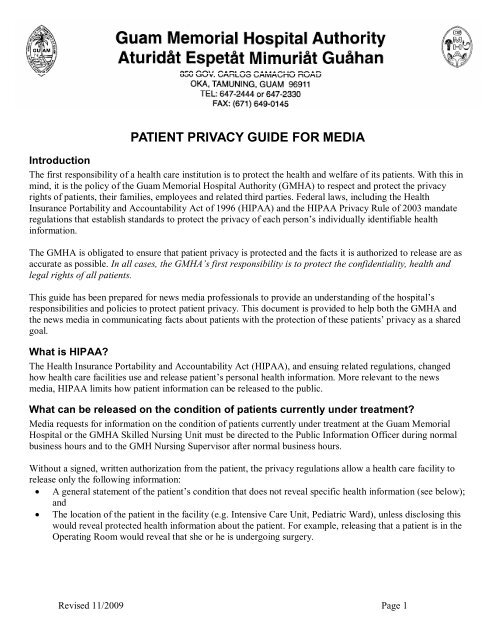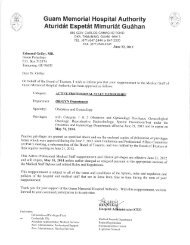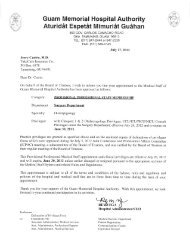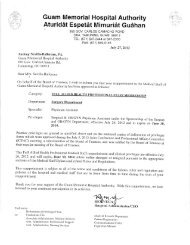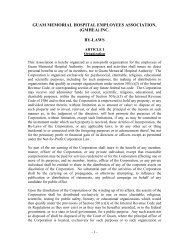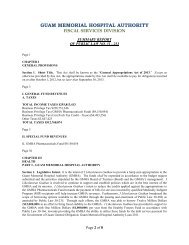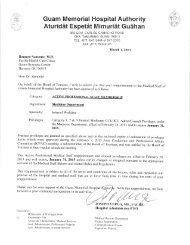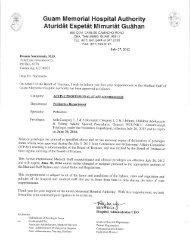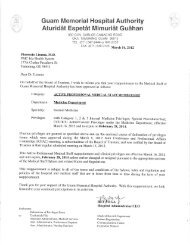GMHA Patient Privacy Guide for Media - Guam Memorial Hospital ...
GMHA Patient Privacy Guide for Media - Guam Memorial Hospital ...
GMHA Patient Privacy Guide for Media - Guam Memorial Hospital ...
Create successful ePaper yourself
Turn your PDF publications into a flip-book with our unique Google optimized e-Paper software.
PATIENT PRIVACY GUIDE FOR MEDIA<br />
Introduction<br />
The first responsibility of a health care institution is to protect the health and welfare of its patients. With this in<br />
mind, it is the policy of the <strong>Guam</strong> <strong>Memorial</strong> <strong>Hospital</strong> Authority (<strong>GMHA</strong>) to respect and protect the privacy<br />
rights of patients, their families, employees and related third parties. Federal laws, including the Health<br />
Insurance Portability and Accountability Act of 1996 (HIPAA) and the HIPAA <strong>Privacy</strong> Rule of 2003 mandate<br />
regulations that establish standards to protect the privacy of each person’s individually identifiable health<br />
in<strong>for</strong>mation.<br />
The <strong>GMHA</strong> is obligated to ensure that patient privacy is protected and the facts it is authorized to release are as<br />
accurate as possible. In all cases, the <strong>GMHA</strong>’s first responsibility is to protect the confidentiality, health and<br />
legal rights of all patients.<br />
This guide has been prepared <strong>for</strong> news media professionals to provide an understanding of the hospital’s<br />
responsibilities and policies to protect patient privacy. This document is provided to help both the <strong>GMHA</strong> and<br />
the news media in communicating facts about patients with the protection of these patients’privacy as a shared<br />
goal.<br />
What is HIPAA?<br />
The Health Insurance Portability and Accountability Act (HIPAA), and ensuing related regulations, changed<br />
how health care facilities use and release patient’s personal health in<strong>for</strong>mation. More relevant to the news<br />
media, HIPAA limits how patient in<strong>for</strong>mation can be released to the public.<br />
What can be released on the condition of patients currently under treatment?<br />
<strong>Media</strong> requests <strong>for</strong> in<strong>for</strong>mation on the condition of patients currently under treatment at the <strong>Guam</strong> <strong>Memorial</strong><br />
<strong>Hospital</strong> or the <strong>GMHA</strong> Skilled Nursing Unit must be directed to the Public In<strong>for</strong>mation Officer during normal<br />
business hours and to the GMH Nursing Supervisor after normal business hours.<br />
Without a signed, written authorization from the patient, the privacy regulations allow a health care facility to<br />
release only the following in<strong>for</strong>mation:<br />
A general statement of the patient’s condition that does not reveal specific health in<strong>for</strong>mation (see below);<br />
and<br />
The location of the patient in the facility (e.g. Intensive Care Unit, Pediatric Ward), unless disclosing this<br />
would reveal protected health in<strong>for</strong>mation about the patient. For example, releasing that a patient is in the<br />
Operating Room would reveal that she or he is undergoing surgery.<br />
Revised 11/2009 Page 1
Requests must meet the following requirements:<br />
The media professional must ask about the patient by name. No in<strong>for</strong>mation may be disclosed if a<br />
request does not include a specific patient’s name.<br />
The patient has been in<strong>for</strong>med that this in<strong>for</strong>mation may be released, through the hospital’s <strong>Privacy</strong><br />
Policy, and the patient has not expressly stated that she or he does not want this in<strong>for</strong>mation released.<br />
What if a patient’s name is not available?<br />
Then no in<strong>for</strong>mation about the patient can be disclosed. While it may be difficult <strong>for</strong> the media to obtain<br />
names of certain patients, such as accident or crime victims, federal regulations prohibit the hospital<br />
from releasing any in<strong>for</strong>mation if a request does not contain a patient’s name. This measure is mandated<br />
by federal privacy regulations.<br />
What patient condition descriptions will be used?<br />
The following one-word condition descriptions, developed by the American <strong>Hospital</strong> Association, will be used<br />
<strong>for</strong> public statements in most instances:<br />
Undetermined –<strong>Patient</strong> is awaiting physician and/or assessment.<br />
Good –Vital signs are stable and within normal limits. <strong>Patient</strong> is conscious and com<strong>for</strong>table. Indicators<br />
are excellent.<br />
Fair –Vital signs are stable and within normal limits. <strong>Patient</strong> is conscious, but may be uncom<strong>for</strong>table.<br />
Indicators are favorable.<br />
Serious –Vital signs may be unstable and not within normal limits. <strong>Patient</strong> is acutely ill. Indicators are<br />
<br />
questionable.<br />
Critical –Vital signs are unstable and not within normal limits. <strong>Patient</strong> may be unconscious. Indicators<br />
are unfavorable.<br />
Note: While nurses and physicians often use the phrase “critical but stable”amongst themselves, a condition of<br />
“critical”by definition means that at least some vital signs are unstable. In general the AHA has recommended<br />
the term “stable”should not be used, especially in combination with other conditions which by definition often<br />
indicate a patient is unstable.<br />
What other in<strong>for</strong>mation can be provided?<br />
No patient in<strong>for</strong>mation that is not included in the <strong>Hospital</strong> Directory may be disclosed without express written<br />
authorization, according to the privacy regulations. Prohibited disclosures include:<br />
The age, gender or ethnicity of a patient;<br />
What the patient is being treated <strong>for</strong>; or the nature of his or her injuries or illness;<br />
How the injuries or illness may have occurred; and<br />
What procedures the patient is undergoing or is scheduled to undergo.<br />
Additionally, disclosure of a patient’s prognosis requires a written release from his or her physician.<br />
Can <strong>GMHA</strong> confirm a patient’s admission or discharge?<br />
Yes, if the request includes a patient’s name. Since this type of disclosure only provides in<strong>for</strong>mation on a<br />
patient’s general condition and location, <strong>GMHA</strong> can confirm to individuals who ask about a patient by name<br />
that the patient is being treated at the hospital or that the patient is no longer at the hospital. Disclosure of time<br />
and date of admission or discharge is not allowed.<br />
Revised 11/2009 Page 2
Can <strong>GMHA</strong> confirm a patient was “treated and released?”<br />
Yes. Under the HIPAA privacy rule, <strong>GMHA</strong> may disclose, to individuals who ask <strong>for</strong> the patient by name, that<br />
a patient was treated and released because this only provides the patient’s general condition (that they were<br />
treated at the hospital) and the patient’s location (that the patient is no longer at the hospital). No specific health<br />
in<strong>for</strong>mation may be provided and time and date of admission or release may not be disclosed.<br />
Can <strong>GMHA</strong> confirm a patient’s death?<br />
Yes, disclosing that a patient is deceased is a permissible facility directory disclosure as a statement of the<br />
patient’s general condition. A patient death may be confirmed by <strong>GMHA</strong> after notification of next of kin,<br />
provided that the above requirements are met. Cause of death and the time and date of death can only be<br />
released by the Office of the Chief Medical Examiner.<br />
What other regulations apply in special circumstances?<br />
Federal laws prohibit the disclosure of any in<strong>for</strong>mation about psychiatric, alcohol and drug abuse cases.<br />
Additionally, in<strong>for</strong>mation on patients who are on isolation or victims of sexual assault may be restricted<br />
pursuant to local and federal law and <strong>GMHA</strong> policy. Other restrictions may be en<strong>for</strong>ced subject to local and<br />
federal law and <strong>GMHA</strong> policy.<br />
Can in<strong>for</strong>mation be released on minor patients?<br />
The privacy regulations do not make special accommodations <strong>for</strong> minor patients’exclusion from the <strong>Hospital</strong><br />
Directory. Generally, minor children (under the age of 18) may have in<strong>for</strong>mation released with the consent of a<br />
parent or legal guardian, in accordance with the preceding guidelines.<br />
What if a patient is incapacitated and cannot consent to disclosure?<br />
If a patient is unable to state a preference about having his or her in<strong>for</strong>mation released, in<strong>for</strong>mation generally<br />
still can be released if the media professional asks about the patient by name. However, the hospital’s practice<br />
in these cases must be (a) consistent with a prior expressed preference of the individual, if any, that is known –<br />
such as if the individual has asked his or her in<strong>for</strong>mation to be private during a past stay. The release of<br />
in<strong>for</strong>mation also must be (b) in the individual’s best interest as determined by the health care provider, in the<br />
exercise of professional judgment. Both conditions must be true <strong>for</strong> a provider to release patient in<strong>for</strong>mation.<br />
What if details about a patient are already “public knowledge?”<br />
The fact that a patient’s personal health in<strong>for</strong>mation may already have been made public through some other<br />
circumstance does not affect <strong>GMHA</strong>’s obligation to protect that patient’s in<strong>for</strong>mation under HIPAA. Police and<br />
fire departments and other organizations are not entities covered under HIPAA, and often can release<br />
in<strong>for</strong>mation a health care facility cannot. In<strong>for</strong>mation in these cases will be released by the <strong>GMHA</strong> following<br />
the same guidelines <strong>for</strong> any other disclosures.<br />
Are interviews, photos and videos of patients allowed?<br />
Photographs, video or interviews can be granted only if a hospital representative obtains the patient’s written<br />
authorization. When the patient is a minor, written authorization of a parent or guardian must be obtained.<br />
<strong>Media</strong> must be escorted by the <strong>GMHA</strong> Public In<strong>for</strong>mation Officer or a designated representative at all times.<br />
Revised 11/2009 Page 3
What about patients who are public figures?<br />
HIPAA does not distinguish between public or private persons and ordinary or infamous injuries. A public<br />
figure does not <strong>for</strong>feit a right to privacy of their medical in<strong>for</strong>mation, and in<strong>for</strong>mation in these cases will be<br />
disclosed according to the above guidelines.<br />
What penalties apply to wrongful disclosure?<br />
<strong>Hospital</strong>s and individuals can face serious penalties <strong>for</strong> disclosing personal health in<strong>for</strong>mation about patients<br />
without proper permission. The Department of Health and Human Services views wrongful disclosure of such<br />
in<strong>for</strong>mation as a violation of civil rights and has delegated the civil en<strong>for</strong>cement responsibilities <strong>for</strong> the <strong>Privacy</strong><br />
Rule to its Office of Civil Rights. Criminal violations are referred to the U.S. Department of Justice.<br />
A person who knowingly uses, obtains and/or discloses private health in<strong>for</strong>mation in violation of these rules<br />
faces a fine of not more than $50,000, imprisonment of not more than 1 year, or both. A person who does so<br />
with the intent to sell, transfer, or use individually identifiable health in<strong>for</strong>mation <strong>for</strong> commercial advantage,<br />
personal gain or malicious harm faces a fine of not more than $250,000, imprisonment of not more than 10<br />
years, or both.<br />
Members of the press: Any person who uses, obtains and/or discloses personal health in<strong>for</strong>mation under false<br />
pretenses –such as if a reporter does not identify herself or himself as such –could be subject to a fine of not<br />
more than $100,000, imprisonment of not more than 5 years, or both.<br />
For More In<strong>for</strong>mation<br />
<br />
<strong>GMHA</strong> Notice of <strong>Privacy</strong> Practices:<br />
http://www.gmha.org/HIPAA/Notice%20of%20<strong>Privacy</strong>%20Practices%20<strong>for</strong>%20gmha.org.pdf<br />
<br />
<br />
<br />
<br />
<br />
<strong>GMHA</strong> Confidential In<strong>for</strong>mation Policy:<br />
http://www.gmha.org/HIPAA/Confidential%20In<strong>for</strong>mation%20policy%20<strong>for</strong>%20gmha.org.pdf<br />
U.S. Department of Health and Human Services’s Summary of the HIPAA <strong>Privacy</strong> Rule:<br />
http://www.hhs.gov/ocr/privacy/hipaa/understanding/summary/privacysummary.pdf (see Page 6, “Facility<br />
Directories”)<br />
45 CFR, § 164.510: http://edocket.access.gpo.gov/cfr_2002/octqtr/45cfr164.510.htm<br />
American <strong>Hospital</strong> Associations Advisory: HIPAA Updated <strong>Guide</strong>lines <strong>for</strong> Releasing In<strong>for</strong>mation on the<br />
Condition of <strong>Patient</strong>s: http://www.aha.org/aha/advisory/2003/030201-media-adv.html<br />
U.S. Department of Health and Human Services’s HIPAA <strong>Privacy</strong> Rule FAQs:<br />
http://www.hhs.gov/hipaafaq/administrative/483.html<br />
Revised 11/2009 Page 4


